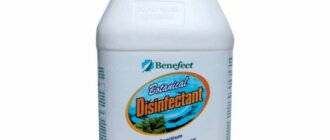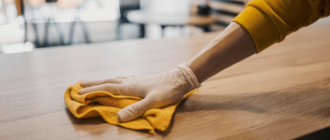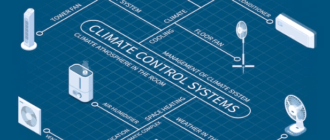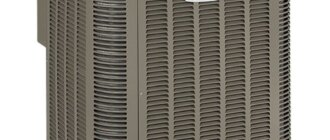Snowstorm HVAC Safety Tips
Winter is a beautiful season, but it can also be harsh on your HVAC system. Snowstorms are common during this period and pose serious threats to your heating and cooling unit if you don’t take appropriate measures to protect it. Accumulation of snow, freezing temperatures, power outages can all lead to costly repairs or even replacement if not handled correctly. That’s why we’ve compiled essential safety tips for you to safeguard your home’s HVAC system from the looming winter storms. From clearing snow regularly to scheduling a professional inspection after the storm subsides, read on for everything you need to know about protecting your HVAC unit during a snowstorm!
The Potential Risks to Your HVAC System During a Snowstorm
Winter is a beautiful season, but it can be harsh on your HVAC system. During snowstorms, your heating and cooling system may face several potential risks that could lead to significant damage or even failure.
- One of the most obvious dangers is the buildup of snow around your outdoor HVAC unit. When snow accumulates, it can block airflow into the unit and cause various issues like overheating or coil freeze-up. This problem often results in reduced efficiency and even complete shutdown if not addressed promptly.
- Another risk associated with snowstorms is freezing temperatures. As temperature drops below freezing point, parts of your HVAC unit are susceptible to becoming brittle and cracking under stress caused by contraction from cold weather.
- Furthermore, heavy storms combined with strong winds may knock down power lines resulting in power outages which affect Heating systems powered by electricity.
It’s important to note these risks so you know how best to protect your HVAC System during winter storms.
Accumulation of Snow
During a snowstorm, it’s not just the roads and sidewalks that get covered in snow. Your HVAC system can also be affected by the accumulation of snow. When snow piles up around your outdoor unit, it can cause blockages and prevent proper airflow to your system.
This lack of airflow means that your HVAC system has to work harder to heat or cool your home, which can lead to increased energy bills and even damage to the system. In addition, if too much snow accumulates on top of the unit, it could cause damage from excess weight and pressure.
It’s important to regularly check on your outdoor unit during a snowstorm and clear any accumulated snow away from it as soon as possible. This will help ensure that there is proper air circulation going through the system and reduces potential damages caused by excessive weight or pressure due to heavy accumulation.
By taking preventative measures against accumulation of snow before and during a storm, you’ll protect both yourself and your HVAC system while ensuring optimal heating performance for years ahead!
Freezing Temperatures
Freezing temperatures can pose a significant threat to your HVAC system during a snowstorm. When the temperature drops below freezing, it can cause several issues with your unit. One of the most common problems is frozen pipes.
When water freezes inside your pipes, it expands and creates pressure that could burst or crack them, leading to costly repairs. Frozen coils are another potential issue that may lead to decreased efficiency or complete damage of your unit.
Additionally, freezing temperatures can also affect the performance of your thermostat by slowing down its response time or causing it to malfunction completely. This situation puts stress on other parts of the HVAC system and may require further maintenance.
When cold weather arrives, it’s crucial to take extra precautions to ensure that all components in your HVAC system are functioning correctly and efficiently.
Essential HVAC Safety Tips for Snowstorms
Snowstorms can be beautiful to look at, but they pose significant risks to your HVAC system. As the temperature drops and snow accumulates, your HVAC system may have to work harder than usual. It’s essential to take precautions during a snowstorm to ensure that your unit stays safe.
- Tip 1: Clear Snow Regularly
One of the most crucial steps in protecting your HVAC system during a snowstorm is to clear snow regularly. As soon as you notice any accumulation on or around your unit, it’s important to act fast and remove it. - Tip 2: Protect Your HVAC Unit
The outdoor unit of your HVAC system is vulnerable to the harsh effects of a snowstorm. Snow and ice can accumulate on it, which can cause damage to its delicate components. - Tip 3: Inspect and Maintain Your System
Regular inspections and maintenance are crucial to keep your HVAC system running smoothly during a snowstorm. - Tip 4: Install a Carbon Monoxide Detector
Carbon monoxide is an odorless and colorless gas that can be deadly when inhaled. During a snowstorm, there’s a possibility of carbon monoxide leaks from your heating system due to blocked vents or damaged equipment. - Tip 5: Know When to Call a Professional
Even if you’re meticulous about maintaining your HVAC system, there may come a time when you need professional assistance.
By following these simple HVAC safety tips for snowstorms, you can keep cozy indoors while minimizing the risk of damage or costly repairs to your heating equipment. Stay safe this winter by taking care of your HVAC unit!
Post-Snowstorm HVAC Care
After a snowstorm, it’s important to take care of your HVAC system to ensure that it is functioning properly and safely.
- Checking for Damages
After a snowstorm, it’s important to check your HVAC system for any damages that may have occurred. The weight of heavy snow and ice can cause significant damage to your unit, so it’s crucial to perform a thorough inspection. - Properly Restarting Your System
After a snowstorm, you may need to restart your HVAC system. But before doing so, there are some essential steps that you should take to avoid further damage. - Scheduling a Professional Inspection
Scheduling a professional inspection is one of the most important steps you can take to ensure your HVAC system’s safety and reliability after a snowstorm.
Conclusion
Protecting your HVAC system during a snowstorm is crucial to ensure its longevity and functionality. With the right safety tips and proper maintenance, you can keep your heating system running smoothly throughout the winter season.
Remember to clear snow regularly, protect your unit from freezing temperatures, inspect and maintain your system, install a carbon monoxide detector, and know when it’s time to call in a professional.
After the snowstorm has passed, be sure to check for any damages that may have occurred due to heavy snowfall or extreme weather conditions. Properly restarting your system is important as well as scheduling an inspection with a professional technician who can identify any potential problems before they become bigger issues.
By following these simple HVAC safety tips for snowstorms, you can keep cozy indoors while minimizing the risk of damage or costly repairs to your heating equipment. Stay safe this winter by taking care of your HVAC unit!
Recent Queries:





